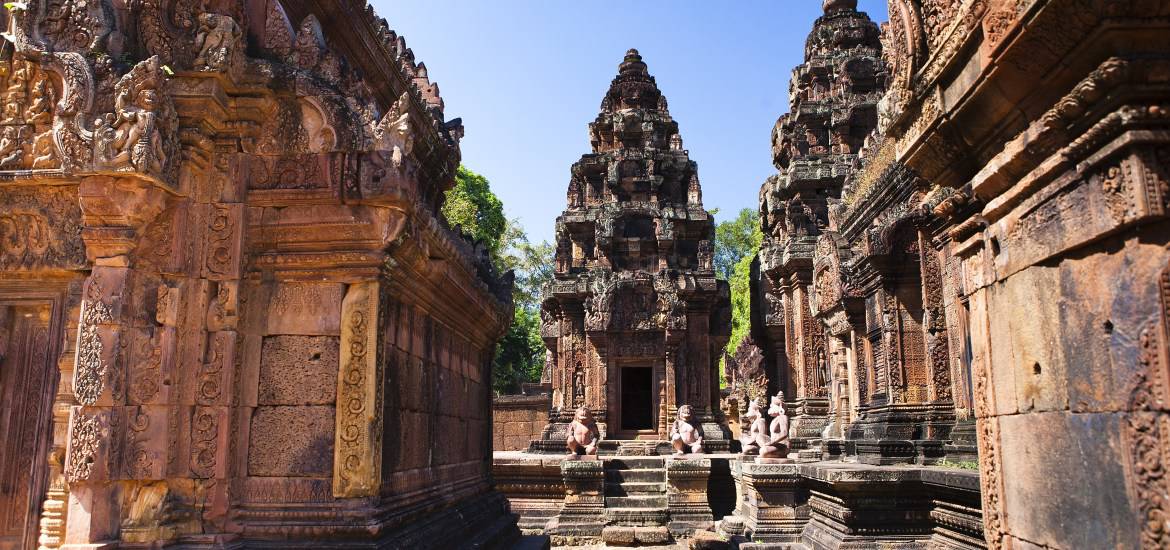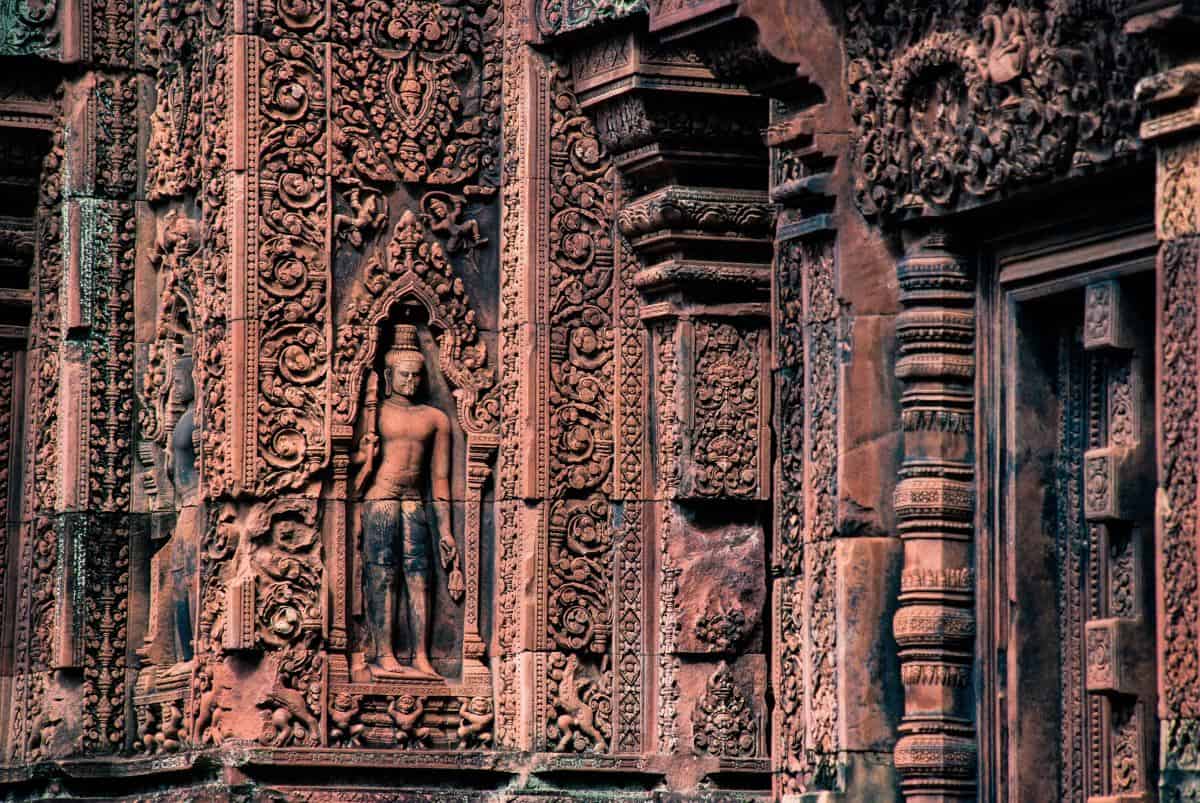I was lucky enough to have more than one day to explore the temples around Siem Reap, something I would highly recommend if you have time. With extra time to explore to my heart’s content, I chose to book an Angkor ‘Outer Temple’ tour.
The Outer Temple Experience of Angkor Wat
There were multiple transport options to choose from for my day of temple touring: a private air-conditioned car, a motorbike, or a tuk-tuk. I opted for the cheapest – a tuk-tuk – as I thought this would allow me more time to take in the surrounding villages and relax.
I was picked up nice and early (although not quite so early as for sunrise!) as I was informed that to get to the first temple in front of most of the crowds we needed to be quick. So at 6.30am I gathered my day bag and a camera, and made my way to my guide for the day and his tuk-tuk.

Banteay Srei
The first temple on the agenda was Banteay Srei, translated as ‘Citadel of the Women’, (approximately 37km north of Angkor Wat). This 10th-century temple is often regarded as the jewel in the crown of Angkorian art due to its sheer beauty and abundance in skilful decoration – some even say it must have been constructed by women due to the level of intricate detail!

Despite its small size, the pink stone and carvings made it one of the more memorable places I visited over my two days of exploring temples. Entrance to Banteay Srei is included in your Angkor ticket – however, you may need a 3-day ticket to cover this and the main loop.
After spending about 90 minutes exploring and photographing Banteay Srei it was time to get back into the tuk-tuk and head towards Beng Melea, one of the temples I had been most looking forward to visiting! Beng Melea is 80km east of Angkor Wat, so the trip took a good 90 minutes; however, this journey was beautiful, going through local villages, where I saw children playing and farmers tending to their crops.
Beng Melea Temple
Along with Ta Prohm (the famous Tomb Raider temple in the main loop), Beng Melea is a temple that has been left to nature. However, unlike Ta Prohm, Beng Melea still feels very rugged as only a few of the trees have been removed.
There is also the opportunity to clamber over ruined walls, explore areas where no other person can be seen, and really feel like you are Indiana Jones for an hour or two! Due to the creepers hanging from the buildings, and crumbling walls, this temple also makes for a photographer’s paradise, so use your inspiration to try and capture the unique atmosphere of the place! Unlike the Banteay Srei temple, there is an additional $5 cost to enter Beng Melea, but I believe this is well worth it for the experience.
Roluos: ancient capital city of Khmer Empire
As it was only about midday by the time I finished the first two temples, I asked my guide to take me to the Roluos Group on the way back to Siem Reap. Roluos was an ancient capital city of the Khmer Empire, back when it was called Hariharalaya. All that remains of the ancient city now are a few temples, but they are some of the oldest you will find in the Angkor complex, dating back to the 9th century.
My favourite of the temples here was Preah Ko which consisted of six brick towers arranged in two rows, all bearing intricate carvings of the Hindu God Shiva. Considering this was never on my itinerary, I was so pleased I visited this complex and had a chance to see some temples which were built even before Angkor.
Cambodian Landmine Museum
As well as these three groups of temples, my guide also suggested I visit the Cambodian Landmine Museum just south of Banteay Srei. This museum was established by a DIY de-miner called Aki Ra, who as a child was captured by the Khmer Rouge and told to lay landmines, and is a real eye-opener displaying a collection of the guns, weaponry and mines which have been deactivated and removed during Aki Ra’s lifetime.
It is thought approximately 40,000 Cambodians have lost limbs to mines, and whilst the casualty rate is decreasing over time, it is predicted that there are more than 4 million pieces of unexploded ordinance left within Cambodian soil. The $5 entry into this museum goes towards supporting the CSHD (Cambodian Self Help De-mining) Charity, and also a school that takes in children who have been a victim of landmines.
Hidden Temple on the Big Loop
Finally, during my second day in Siem Reap, I was able to do the Big Loop trip with the same tuk-tuk guide. Whilst I included all of the usual stops such as Angkor Wat, Angkor Thom (with Bayon) and Ta Prohm, I had done a bit of research prior to arriving in Cambodia and read about a hidden temple called Ta Nei. I asked my guide to take me there, and he admitted he had never been so would need to ask for directions. After travelling a few kilometres down a rather bumpy dirt track without passing anyone, the forest canopy opened and a beautiful temple appeared.
Ta Nei was the kind of temple you dream of visiting when you come to a place like Angkor. You have to climb up the crumbling walls to enter, but when you do you are inside an excellent jungle temple with overgrown plants and moss-covered stone. Unlike any of the others I visited, this temple was completely deserted. Ta Nei is another excellent place for photography and will undoubtedly be the temple I remember most about my time in Angkor.
Any time you spend in Angkor will be a magical experience. However, these lesser-known temples are ideal for photographs and will give you memories not everyone gets from their time in Siem Reap. Happy temple touring!
Guest writer Kelly Semper travelled through Cambodia and Vietnam on a Stray Asia Tour. Her favourite aspects of travelling are tasting exotic new foods, photographing hidden wonders and getting off the beaten track.


I went to this temple last year and I must say this is a great piece of art. Temples of Angkor spreaded over a big area very big and one can spend all his day to explore this temple.